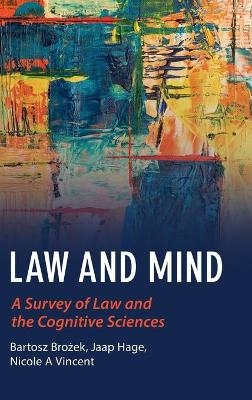
Law and Mind
Cambridge University Press (Verlag)
978-1-108-48600-2 (ISBN)
Are the cognitive sciences relevant for law? How do they influence legal theory and practice? Should lawyers become part-time cognitive scientists? The recent advances in the cognitive sciences have reshaped our conceptions of human decision-making and behavior. Many claim, for instance, that we can no longer view ourselves as purely rational agents equipped with free will. This change is vitally important for lawyers, who are forced to rethink the foundations of their theories and the framework of legal practice. Featuring multidisciplinary scholars from around the world, this book offers a comprehensive overview of the emerging field of law and the cognitive sciences. It develops new theories and provides often provocative insights into the relationship between the cognitive sciences and various dimensions of the law including legal philosophy and methodology, doctrinal issues, and evidence.
Bartosz Brożek is Professor at the Faculty of Law and Administration and the director of the Copernicus Center for Interdisciplinary Studies at the Jagiellonian University in Kraków. He holds PhDs in law and philosophy, and specializes in legal philosophy, epistemology, theories of argumentation, as well as moral and mathematical cognition. He is the author of 20 book monographs, the editor of 24 volumes, and the author of more than 100 research papers. Brożek has received numerous scholarships and awards, including Humboldt Fellowship. He is the co-creator of the Copernicus Festival in Kraków as well as the MOOC platform Copernicus College. Jaap Hage holds the chair for Jurisprudence at Maastricht University. His research has focused on the ontology and logic of law, basic legal concepts, the methods of legal science, and – most recently – law and the cognitive sciences. His scientific publications include Reasoning with Rules, Studies in Legal Logic, and Foundations and Building Blocks of Law. Nicole A Vincent is Senior Lecturer, Faculty of Transdisciplinary Innovation at the University of Technology Sydney. An analytic philosopher, she focuses on the social, legal, policy, and ethical implications, applications, challenges, and opportunities of advances in science and emerging technologies. Her publications have been cited in the Supreme Court of the United States and by the Presidential Commission for the Study of Bioethical Issues. She also spearheaded the development of the Australian Neurolaw Database. Her edited volumes, Neuroscience and Criminal Responsibility (2013) and Neurointerventions and The Law: Regulating Human Mental Capacity (2020) are core neurolaw reference texts.
1. Between Law and the Cognitive Sciences. A Manifesto Bartosz Brożek, Jaap Hage; Part I. Metatheory and Methodology: 2. Are the Cognitive Sciences Relevant for Law? Jaap Hage; 3. Social and Normative Facts Carsten Heidemann; 4. Law, Folk Psychology and Cognitive Science Łukasz. Kurek; 5. Law and the Cognitive Science of Ordinary Concepts Kevin Tobia; Part II. Ontology and Epistemology: 6. Cognitive Science and the Nature of Law Corrado Roversi; 7. The Architecture of the Legal Mind Bartosz Brożek; 8. The Psychology of the Trial Judge Morris B. Hoffman; 9. Institutional Design and the Psychology of the Trial Judge Adi Leibovitch; 10. Bias as the Surface or the Core? A Comment on the Psychology of the Trial Judge Eyal Aharoni; Part III. Legal Doctrine and Cognitive Sciences: 11. Private Law and Cognitive Science Przemyslaw Palka; 12. Private Law and Cognitive Science: A Methodological Commentary Bartosz Brożek, Marek Jakubiec; 13. Responsibility, Liability, and Retribution Jaap Hage and Antonia Waltermann; 14. Guilt in Criminal Law: Guilt in Us or in Stars? Mikołaj Małecki and Marek Sławiński; 15. The Insanity Defense Gerben Meynen; 16. Thoughts on the Insanity Defense Lisa Claydon and Paul Catley; Part IV. Evidence: 17. Implications of Neurotechnology: Brain Recording and Intervention Pim Haselager; 18. Neuroimaging Evidence in US Courts Jane Campbell Moriarty; 19.1. Neuroscientific Evidence in Context D.W. Denno; 20. Some Issues in Interpreting Neuroscientific Evidence Bartłomiej Kucharzyk; 21. Explanation-Based Approaches to Reasoning About Evidence and Proof in Criminal Trials Anne Ruth Mackor, Hylke Jellema and Peter J van Koppen; Part V. Dissenting Opinions: 22. A Non-Naturalist Account of Law's Place in Reality George Pavlakos; 23. The Law & Cognitive Science Enterprise: A Few Analytic Notes Pierluigi Chiassoni; 24. The Cognitive Approach in Legal Science and Practice: A History of Four Revolutions Jerzy Stelmach.
| Erscheinungsdatum | 19.04.2021 |
|---|---|
| Reihe/Serie | Law and the Cognitive Sciences |
| Zusatzinfo | Worked examples or Exercises |
| Verlagsort | Cambridge |
| Sprache | englisch |
| Maße | 230 x 150 mm |
| Gewicht | 920 g |
| Themenwelt | Geisteswissenschaften ► Psychologie ► Allgemeine Psychologie |
| Geisteswissenschaften ► Psychologie ► Verhaltenstherapie | |
| Recht / Steuern ► Allgemeines / Lexika | |
| Recht / Steuern ► EU / Internationales Recht | |
| Recht / Steuern ► Privatrecht / Bürgerliches Recht ► IT-Recht | |
| ISBN-10 | 1-108-48600-2 / 1108486002 |
| ISBN-13 | 978-1-108-48600-2 / 9781108486002 |
| Zustand | Neuware |
| Haben Sie eine Frage zum Produkt? |
aus dem Bereich


